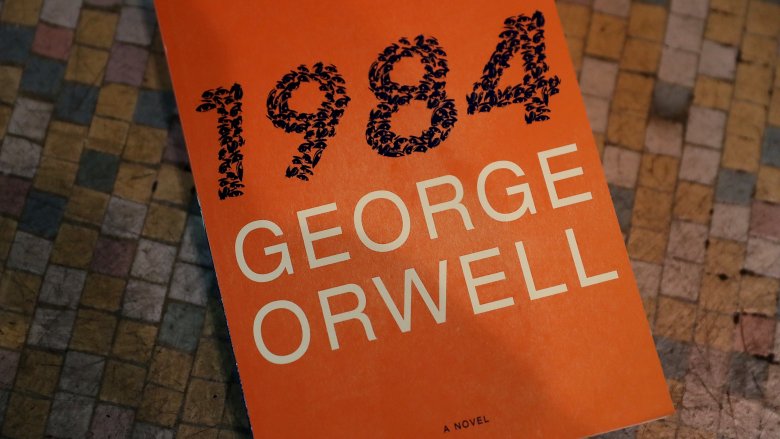The Untold Truth Of Big Brother
Audiences have been expecting the unexpected on CBS' Big Brother for almost 20 seasons now, and the fan favorite reality show isn't showing any signs of slowing down. The popular series has a pretty simple concept: Put a group of diverse people in a house together, cut them off from the rest of the world, and make them compete for $500,000. However, there have still been many, many bumps along the Big Brother road, picking up some crazy contestants and controversies along the way. Here's the untold truth of Big Brother.
The first season was completely different
Any Big Brother fan can enthuse about Head of Household and Power of Veto competitions, but only hardcore fans remember the show before those existed. Back in season one, Big Brother had an entirely different format, eliminating many of the competition and strategy elements and instead allowing viewers to vote for which contestants would be kicked out of the house.
There still were some familiar elements, though. Producers picked ten houseguests, who all lived together and were filmed constantly, with viewers watching live feeds online. Every other week, the houseguests voted for two people to be up for nomination; America then voted for someone to be eliminated come that week's live show. Viewers ultimately voted for Eddie McGee to win the top prize that season.
Critics and fans weren't a huge fan of the first season, which followed a similar format to the international editions of the show — TV Guide wrote that it had "possibly the worst reviews in television history." Although the show struggled with critics, CBS Entertainment president Leslie Moonves (who is also married to Big Brother host Julie Chen) still said it improved their usual summer viewership with an average of 9.1 million people tuning in per episode — which is probably why it returned for a second season.
There was a lawsuit over the title
Even though Big Brother's first season wasn't exactly a hit, it still prompted its own lawsuit. Chicago attorney Marvin Rosenblum filed a copyright infringement suit against CBS, its then-parent company Viacom, and Orwell Productions, Inc. for reportedly stealing the name for the show from George Orwell's classic novel 1984. In his suit, he also alleged that the constant cameras in Big Brother drew from the heavy surveillance featured 1984.
Rosenblum produced the 1985 film based on the book and owned the TV and film rights to the novel, and he alleged that CBS was infringing on them by airing the show and using that title. Although some questioned the legitimacy of the lawsuit, a U.S. District Court Judge denied CBS' motion to dismiss it. CBS later settled the suit out of court for an undisclosed sum.
A threat against a contestant led to a lawsuit
Big Brother may have gotten its format back on track for season two, but the season was almost derailed early on by a terrifying incident between contestants Justin Sebik and Krista Stegall. The incident involved Sebik taking a kitchen knife and holding it to Stegall's throat as the two made out in the kitchen.
Producers did not stop the incident at the time, even though Sebik told Stegall that he was going to "slash" her throat. "Would you get mad if I killed you now?" he asked her. "No, I want some water," she replied. A report later revealed that Sebik has previously been arrested on assault charges in 1996 and charged with assault and theft in 1997, but was still allowed in the house.
Sebik was later expelled from the house by producers, while Stegall placed sixth. (She is also known for getting engated to Mike "Boogie" Malin on the finale, although the two later broke up.) After the show ended, Stegall filed suit against CBS for negligence, knocking them for letting Sebik on the show and not evicting him due to earlier violent behavior. She asked for them to reimburse her for the psychological counseling she sought afterwards. It was never reported how the suit played out.
CBS had to place a warning before the show's controversial fifteenth season
Big Brother season 15 was hugely controversial, and rightfully so. A number of houseguests (led primarily by Aaryn Gries and GinaMarie Zimmerman) were caught on the live feeds making racist and derogatory remarks toward their fellow contestants, including saying that an Asian-American contestant should "go make some rice" and saying to watch out for an African-American contestant in the dark because you "might not be able to see the b****."
CBS received a lot of flack for their decision to allow the offenders to stay in the house after making the comments, and they received even more flack for deciding not to air the comments on the live broadcast. Eventually, though, they gave into the demands of the live feeders and aired a segment featuring some of the contestants' worst comments and responses from other players.
Still, though, fans weren't happy, and more than 27,500 people signed a petition asking for Gries to be evicted from the house. When she ultimately was evicted, the live audience booed a contestant for the first time. CBS ultimately decided to add a disclaimer before airing the season's episodes, noting for the first time in the show's history that the houseguests may at times "reveal prejudices and other beliefs that CBS does not condone."
Multiple contestants have lost their jobs due to comments made inside the house
The racism, homophobia, and awfulness of season 15 spilled outside of the house as well, with multiple contestants losing their jobs over their comments. These people included Gries, who was dropped from her modeling agency, and Zimmerman, who was fired from her job as a pageant coordinator.
Spencer Clawson, who was caught on camera saying c***, among other slurs, was targeted in a statement by his employer, Union Pacific, although he continued to work for them. He eventually left the company at a time before December of 2013, although it's unclear if he was fired or left of his own volition.
Winner Andy Herren was also criticized by his employer, the College of DuPage, on Facebook, with the college writing that he was no longer in their employ. They would not comment on whether or not that change happened before the show. The Big Brother house may be closed off from the rest of the world, but that doesn't mean the game doesn't lead to real life consequences.
Season nine's winner went to jail for drug dealing
Big Brother decided to air their first winter edition as filler during the 2007-08 Writers' Strike. The show's ninth season is widely regarded as one of their worst, with extra controversy added thanks to the winner, Adam Jasinski, who reportedly came under fire for comments he made about mentally ill persons. When Jasinski took home his $500,000 prize, he told Chen that he planned to give a fifth to charity and use the rest to start a business.
Jasinski never gave the money to charity, but he did actually start a business— just not a legal one. Jasinski used his prize money to fund a drug-selling business, ultimately getting caught by the authorities after trying to fly from Florida to Massachusetts with oxycodone pills in his carry-on bag in October of 2009.
Jasinski plead guilty to one count of possession with intention to distribute oxycodone and was sentenced to 48 months in prison. His partner in crime? Fellow Big Brother contestant Matt McDonald, who was eventually sentenced to 36 months in prison on charges of conspiracy to possess with the intent to distribute oxycodone.
Jasinski eventually revealed that he was addicted to pain killers following a car accident in college. His drug addiction culminated in him sneaking OxyContin into the Big Brother house. Producers eventually discovered his stash during week two and forced him to throw it out, putting him in withdrawal. However, they denied knowing about his problem before he entered the house.
Houseguests get a stipend for their time in the house
Houseguests often have to give up their jobs to make their way into the Big Brother house, but they don't go completely uncompensated even if they don't come out with the top prize. Houseguests actually get a stipend for each week they are in the house—as of 2007, it was reported as being $750 per week; in 2017, houseguests said it was $1,000 per week.
This stipend actually sometimes leads to some backroom strategizing between contestants. Some contestants try to convince others to keep them around at least until jury, so that they can continue to get their stipend while they sit around and relax in the jury house. Of course, this is Big Brother, so you can never take someone at their word— but still an interesting strategy, and one that rarely gets played out on air.
The house gets pretty disgusting
If you put a bunch of people in a house together, there's bound to be messy fights—and a messy kitchen. As many Big Brother contestants quickly learn, just because you're in a game doesn't mean you don't have to do your dishes, especially considering the pests that seem to pop up in the Big Brother house year after year.
The kitchen is often plagued by ants by a few weeks into the summer, with houseguests leaving dirty food and dishes around for them to feast on. The ants have become so noticeable that some Big Brother live-feeders started a #TeamAnts hashtag on Twitter — the ants also have their own account, which has more than 200 followers. In some seasons, the house gets so disgusting that they even have to deal with rats.
Contestants aren't allowed to sing in the house
If you've watched the Big Brother live feeds, you've probably heard a producer put a kibosh on a contestant's would-be musical moment before it starts, often pulling up the dreaded fish (something to look at while the feeds go offline) in the process. The reason for this is that contestants aren't actually allowed to sing copyrighted songs in the house.
Big Brother could get in trouble for those songs popping up on the live feeds, and if something dramatic happened to occur during the song, they wouldn't be able to broadcast it without having to pay a lot of money. Producers will turn off the feeds and allow the houseguests to sing "Happy Birthday" as necessary, though. (They even shelled out the bucks to air a "Happy Birthday" moment in season 10, with houseguests singing potentially the most awkward rendition of the song of all time following a blowout fight.)
Sequestering the jury wasn't always a thing
When a houseguest gets eliminated during the jury stage of Big Brother, they're sent to the jury house, where they're kept sequestered away from the influence of the outside world until they can place their vote for the winner on finale night. Even though that seems like it should have been a give-in, the sequestered jury wasn't always a thing, and it had disastrous results for one contestant.
That houseguest was the cunning Danielle Reyes, who made it to the final two of the show's third season with some smart strategy moves. Although Reyes maintained good relationships with most of her fellow houseguests, she was also brutally honest when talking about them in the diary room.
Because the jury wasn't sequestered that year, they were all able to watch the footage of Reyes trashing them. They were none too happy about her candidness, and many fans believe that is why they wound up voting for Lisa Donahue to win the $500,000 prize. From the next season on, the jury was sequestered, allowing houseguests to continue expressing their honest opinions without worrying about it killing their game.
Producers may manipulate contestants
Big Brother may seem like a reality show that would be hard to manipulate— contestants are on camera nearly 24/7, after all. However, according to some contestants, they still find a way.
The Diary Room is where Big Brother contestants go to give their unfiltered thoughts on events and houseguests. However, some contestants allege that it's also where producers sometimes try to plant thoughts in their heads about who to eliminate or who to keep in order to make the game more exciting. Some contestants say producers use the "power of suggestion" to try to get houseguests to see things a certain way.
"They don't come out and say, 'Oh, Ryan's going to evict you, how do you feel about that?' or 'Allison said this about you,'" said season nine contestant Sheila Kennedy. "They let you go in there and talk and then they basically go, 'OK, well, what's going on? Do you feel like half the house is against you? What are you going to do about it? Are you playing this game, or are you just going to lay down and die?'"
Still, other contestants say Big Brother is about as pure as reality shows come. Big Brother All-Stars winner Mike "Boogie" Malin said that while there's always "conjecture" that producers manipulate the game to keep their favorites around, he thinks it's "totally false." "I don't believe for one second that there's any kind of manipulation on their behalf," he said.
The Big Brother house can get very, very boring
It's not easy to entertain yourself for three months, but that's just what Big Brother houseguests are expected to do. Although the houseguests aren't given books, movies, or television, they still have to find a way to pass the time when they aren't in competitions.
As feedsters can tell you, this usually means a whole lot of sleeping. (Season 15 winner Andy Herren said he was sleeping 15 to 18 hours a day during the last week of the competition because there was nothing else to do.) Sometimes, contestants will be given some entertainment, like pool toys, but it's rare.
"The day-to-day life in there is absolutely, crushingly monotonous," said season four contestant Jack Owens. Added Kennedy, "I never realized how much downtime there was. I was telling one of the producers when I was in the Diary Room that I literally wanted to chew my arm so it'll start bleeding to have something to do because I'm so frickin' bored out of my mind."
Boredom may also be part of what leads to Big Brother's showmances. Erika Landin, who was in a relationship with Malin during Big Brother All Stars, said that while she "hate[s] to say" it, she did see making out with him as "kind of a time-killer." "'Nothing else to do, want to kiss?'" she said. Well, that's one way to pass the time.
Some fans go to great lengths to influence the game
Most fans who want to influence the Big Brother game go to CBS' website and vote in viewer polls for their bit of power, but some are willing to take things much further. The house has dealt with a frequent problem of banner planes being hired by avid fans to spread messages right into the houseguests' backyard.
Banner messages date all the way back to season one, when an enterprising fan flew a banner over the house saying, "Big Brother is worse than you think. Get out now." Fans have continued to try to influence the game with the banners, to mixed results — generally, when a banner flies over the house, producers usher everyone inside too quickly for them to get the message.
Still, CBS has tried to put a kibosh on the banners in the past. In season ten, CBS sent a cease and desist letter to Jerry Hider of Blue Yonder Aerial Advertising to prevent him from flying a banner revealing season eight's America's Player twist to the houseguests. This isn't the only way fans try to influence the game, either — some line up to try to yell things to the houseguests from outside the compound.








